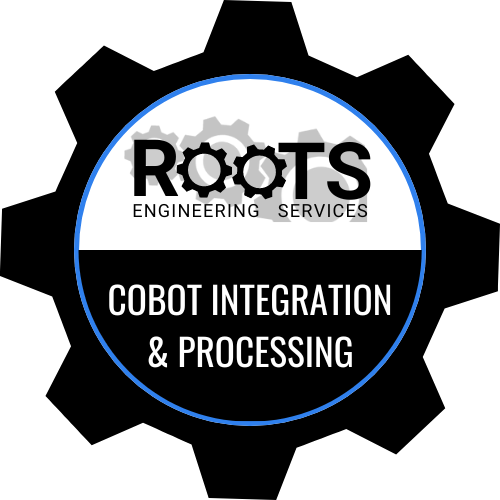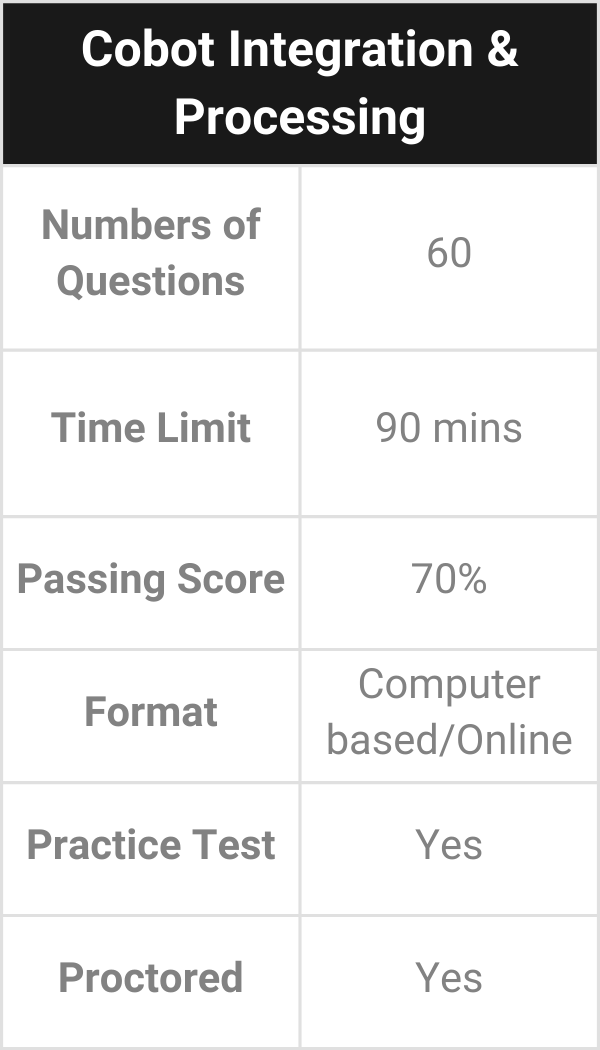Cobot Integration & Processing
Certification
The ROOTS CIP Certification signifies a candidate’s readiness to excel in the robotics and automation industry. This certification validates that students have both the theoretical knowledge and practical skills needed to design, integrate, and optimize manufacturing cells involving cobots. This certification equips students with the expertise to contribute effectively and immediately to the workforce, making them valuable assets in any automation or robotics-related role.

What are the benefits of getting certified?
Industry-Recognized Validation: Earning the CIP Certification provides you with industry-recognized validation of your expertise in robotics and automation, showcasing your skills to potential employers.
Hands-On Experience: Gain practical, hands-on experience in assembling and integrating manufacturing cells involving cobots, making you job-ready from day one.
Enhanced Employability: The CIP Certification enhances your employability by equipping you with the specialized skills needed to excel in advanced manufacturing environments.
Competitive Edge: Stand out in the job market with a certification that demonstrates your ability to apply theoretical knowledge to real-world scenarios, making you a valuable asset in the robotics field.
Independent Decision-Making: Position yourself as a skilled professional capable of making high-level, independent decisions, ensuring you’re prepared for leadership roles in the industry.
Objectives Addressed by the CIP Certification:
- Understand the history, applications, and evolution of robotics and automation.
- Define Industry 4.0 technologies and their role in modern manufacturing.
- Identify and operate different types of industrial robots, including collaborative robots (cobots).
- Apply safety procedures in industrial settings, following OSHA guidelines and risk assessments.
- Develop fundamental measurement skills using the metric system for real-world applications.
- Demonstrate proficiency in electricity, electronics, and industrial control systems like PLCs and CNC machines.
- Create and develop factory cell layouts, including process mapping and CAD digitization.
- Program and install cobots, including basic programming, movement types, and safety systems.
- Understand and install end-of-arm tooling (EOAT) and manage pneumatic systems for cobots.
- Perform troubleshooting and root cause analysis in manufacturing processes.
- Apply quality assurance principles, including lean manufacturing, Six Sigma, and metrology.
- Integrate sensors, actuators, and conveyor systems into cobot-driven automation cells.
Test Security and Irregularities
- The Cobot Integration & Processing Certification is a closed-book exam with no assistance from proctors or other test candidates.
- Security Measures: All test materials are confidential, and students must follow security policies, such as taking the exam at the scheduled time, not opening materials until instructed, and not removing materials from the room.
- Consequences for Violations: ROOTS Engineering Services will cancel the scores of any student found violating these security measures. Serious breaches, such as unauthorized recording or sharing of test content, may result in a ban from future exams.
Score Invalidation Procedures
- ROOTS Engineering Services will invalidate any scores if a student is found cheating or violating exam security. This includes unauthorized access to exam content, removing materials from the test site, or using prohibited aids.
- ROOTS Engineering Services reserves the right to ban students from future exams if deliberate attempts to cheat or share exam content are discovered. The duration of the ban will depend on the severity of the violation, and ROOTS may share information about banned students with their educational institutions.
Documentation
All interactions, including test scheduling, retest requests, and certification issuance, must be documented and securely stored by ROOTS Engineering Services administrative staff.
Compliance
Adherence to this SOP is mandatory for all parties involved in the CIP certification testing process. Non-compliance could affect the validity of the certification test and result in the non-issuance of a CIP certification.
Procedures
1. Scheduling, Rescheduling, and Test Preparation
1.1 All scheduling and rescheduling requests should be emailed to customer.support@rootsengineering.co.
1.2 A minimum of 72 hours notice is required for scheduling or rescheduling CAROL 4.0 certification tests.
1.3 Schools must inform ROOTS Engineering Services of any absences immediately, allowing 72 hours for exam rescheduling.
1.4 Schools should aim to combine retest events for absentees and students who did not pass the initial test.
1.5 Students are required to sign in and sign out with the proctor at their examination time.
2. Certification Testing and Proctoring
2.1 The proctor will administer the CIP certification test at the scheduled date and time.
2.2 The CIP certification is a closed-book exam with no assistance allowed from the proctor, other candidates, or any electronic devices.
2.3 Upon completion of the test, students will receive a preliminary score, but official certification status is determined by ROOTS Engineering Services after a full review of the proctored materials.
3. Retesting and Absentee Rescheduling
3.1 Students who fail the certification test may retake the exam up to three times, with a required 20-day waiting period between attempts for secondary students.
3.2 Each retest will provide a new version of the exam to ensure the integrity of the testing process.
3.3 Names of students requiring a retest must be submitted by email to ROOTS Engineering Services immediately to facilitate testing according to the 20-day waiting period.
4. School District/College Test Management
4.1 At the discretion of ROOTS Engineering Services, a school district or college may manage the enabling and disabling of tests within a 3-hour window.
4.2 A proctor must supervise all exams at all times, ensuring students adhere to sign-in/out protocols.
5. Issuance of Official Certification
5.1 ROOTS Engineering Services requires 72 hours to process and issue official certifications to the college/school for students who have passed the CIP certification test.
5.2 An official certification from ROOTS Engineering Services will include a serial number and is the only document that officially certifies a student.
5.3 Certifications will be sent by email to the appropriate school district/college staff for distribution to students.
The technical requirements for accessing the certification website include:
- Supported Browser: Latest versions of Chrome, Firefox, Safari, or Edge.
- Internet Connection: A stable high-speed internet connection (at least 10 Mbps).
- Device: Desktop or laptop computer with at least 4GB RAM and an updated operating system (Windows 10 or macOS 10.12 or higher).
- Screen Resolution: Minimum of 1280×800 pixels.
- JavaScript and Cookies: Must be enabled in your browser settings.
- Pop-up Blockers: Disable any pop-up blockers or ensure the site is whitelisted.
- PDF Reader: Ability to view PDF documents (Adobe Acrobat Reader or similar).
- Multimedia Support: Speakers or headphones for video content and a webcam/microphone if necessary for virtual proctoring.
READY TO take one of our industry certifications?

